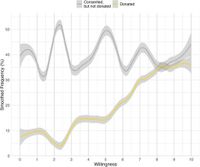A recent study has cast new light on the effectiveness of willingness measures in social science research, particularly when it comes to predicting real-world behavior related to data sharing. This research focused on validating an intention measure concerning the donation of social media data by comparing expressed willingness with actual participation.
In a two-phase study, researchers conducted a survey in 2022 that asked participants about their willingness to donate social media data in hypothetical situations. Fast forward nine months, and the same respondents were invited to participate in an actual data donation study in early 2023. The results revealed a moderate correlation (η: 0.28) between expressed willingness and actual data donation, suggesting that while there is some alignment between the two, significant gaps remain.
The study, conducted by a team including researchers Zoltán Kmetty and Ágnes Stefkovics, utilized a unique within-person comparison method to challenge the predictive validity of willingness measures often implemented in vignette and conjoint experiments. A total of 1,000 respondents participated in the hypothetical scenarios, while 769 consented to the actual data sharing process. Notably, 62% of respondents in the follow-up study consented to share their data, but only 21% completed the donation—a rate that still holds significance when compared to previous research.
One major finding of the study is the divergence between the factors influencing participants' stated willingness and their real-world sharing actions. The willingness to donate was more closely associated with softer attitudinal variables, such as personal opinions and feelings, whereas actual data sharing was influenced more by harder demographic variables, such as age and education levels. This challenges the reliability of traditional willingness measures used in social science studies that aim to isolate decisions in complex situations.
The study’s background reveals that vignette and conjoint experiments are commonly used to elicit individuals’ preferences and analyze their decision-making processes when faced with various options. These experimental designs aim to simulate real-world scenarios to draw more accurate conclusions about behavior. However, previous research has shown mixed results regarding the predictive validity of these measures. Some studies affirm that expressed intentions correlate well with actual behaviors; others suggest a disconnect between hypotheses and observed actions.
When comparing the data donation rates from this study with earlier work, the moderate correlation suggests further exploration is needed to enhance the accuracy of willingness measures. The self-reported willingness level averaged at 5.1 on a scale from 0 to 10, highlighting a potential gap between participants' hypothetical acceptance and the reality of sharing sensitive data.
Furthermore, the complexity involved in actual data donation procedures could be a contributing factor to the observed drop in follow-through among respondents who initially consented. Participants faced tasks such as downloading their digital dataset from social media platforms and uploading it to the study’s platform, a process that can be daunting, especially for those with lower digital literacy.
The implications of these findings suggest a need for researchers to design experiments that mirror real-world risks, minimizing the perceived burdens associated with participation in data donation studies. Future methodologies should address the discrepancies observed in consent and actual donation behaviors, allowing for improved understanding of human data-sharing actions.
As the landscape of data donation evolves, researchers are called to innovate and validate experimental designs that genuinely reflect the complexities of real-life decision-making. This study has laid essential groundwork for future investigations and reinforces the notion that while psychological attitudinal factors are crucial, they should be carefully balanced against demographic influences to improve data-sharing frameworks across social science research.

